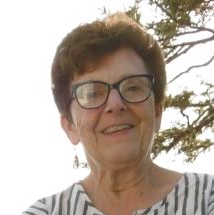
 Impact Earth: Advocacy, Episode 1, Mary E. Guss is currently a part-time attorney, doing contract work with Indian tribes. She received her B.A. from Reed College in Portland, Oregon, majoring in philosophy, and her law degree in 1976 from Lewis & Clark. She then traveled to Alaska to clerk for the Ketchikan Superior Court judge for a year. Instead, she stayed and practiced law there for three decades, over half of it as a solo practitioner doing a wide variety of legal work. Guss also served as the part-time federal magistrate judge for Ketchikan, owned a bookstore for a short while, and volunteered with the Girl Scouts, the local public radio station, the community band and Youth Court.
Impact Earth: Advocacy, Episode 1, Mary E. Guss is currently a part-time attorney, doing contract work with Indian tribes. She received her B.A. from Reed College in Portland, Oregon, majoring in philosophy, and her law degree in 1976 from Lewis & Clark. She then traveled to Alaska to clerk for the Ketchikan Superior Court judge for a year. Instead, she stayed and practiced law there for three decades, over half of it as a solo practitioner doing a wide variety of legal work. Guss also served as the part-time federal magistrate judge for Ketchikan, owned a bookstore for a short while, and volunteered with the Girl Scouts, the local public radio station, the community band and Youth Court.
In 2008 she went back to school, pursuing a long-time interest in indigenous peoples law. She obtained an LLM from Arizona’s Indigenous Peoples Law and Policy Program in the spring of 2009 and was shortly thereafter hired to work for the program. Her work included serving as IPLP staff attorney, writing wills for Tohono O’odham clients while teaching a tribal will-writing clinic, as well as coordinating the Lunch in Indian Country CLE series with the state bar. Topics she has spoken on for this program include Tribes and Climate Change, the Cobell Land Buyback and tribal will writing. Currently she sits on the Salt River Pima Maricopa tribal appellate court and does will writing for the Confederated Tribes of the Umatilla Indian Reservation
SUPPORT THE CREATION OF PODCASTS LIKE THIS ONE: BECOME A MEMBER TODAY!
INSIGHTS
- How did Mary get invested in the issues facing indigenous peoples? It started with a research paper and developed through the stories of the Indian tribes she was engaging with – join us to hear more!
- There are approximately 577 federally recognized Indian tribes in the United States – why does it matter that a tribe is federally recognized? Mary gives us the information needed to understand how important this process is in the United States.
- The first and second largest reservations are located in Arizona.
- The issue of rising sea levels is not a new issue – the first tribe that voted to move its community due to sea level rise happened in the early 1990s.
- Mary focuses on two tribes when she reports on Indian tribes being impacted by rising sea levels – join us for this podcast to learn about both of these tribes and why they are at the center of Mary’s work.
- There is strong evidence that Louisiana is the fastest disappearing land mass on Earth.
- The cultural, economic, political and lifestyle factors that are at play (with each tribe facing the impact of climate change on their community) are essential to understand so that we may fully appreciate what they are facing – and work to support them in finding the correct solutions.
- How does all of this impact indigenous peoples’ health? What happens to health rates when traditional foods cannot be accessed and consumed, because of climate change? Important insights shared on this show.
- Listening to other’s stories, respecting those stories and helping to spread the word – these are the things that we all can do for each other.
GET INFORMED!
- Listen to Mrs. Green’s podcast with Faith Gemmill: Alaska & Global Warming – Climate Genocide, mentioned during this podcast.
GET ACTIVE!
- Watch the videos Mary mentions during the podcast: Can’t Stop the Water, Last Stand on the Island, The Vanishing Island and Lowland Kids